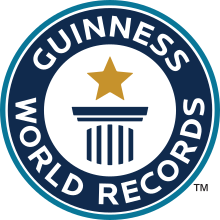Guinness Publishing
 |
|
| Editor | Craig Glenday (ed.) |
|---|---|
| Cover artist | Simon Jones |
| Language | English, Arabic, Bulgarian, Chinese, Croatian, Czech, Danish, Dutch, Estonian, Filipino, Finnish, French, German, Greek, Hebrew, Hungarian, Icelandic, Italian, Japanese, Korean, Latvian, Norwegian, Persian, Polish, Portuguese, Romanian, Russian, Slovak, Slovene, Spanish, Swedish, and Turkish |
| Subject | World Records |
| Genre | Reference |
| Publisher | Jim Pattison Group |
|
Publication date
|
November 10, 1951–present |
|
Published in English
|
1955–present |
| Media type | Book, Television |
Guinness World Records, known from its inception in 1955 until 1998 as The Guinness Book of Records and in previous U.S. editions as The Guinness Book of World Records, is a reference book published annually, listing world records and national records, both of human achievements and the extremes of the natural world. The book itself holds a world record, as the best-selling copyrighted book of all time. As of the 2017 edition, it is now in its 63rd year of publication, published in 100 countries and 23 languages. The international franchise has extended beyond print to include television series and museums. The popularity of the franchise has resulted in Guinness World Records becoming the primary international authority on the cataloguing and verification of a huge number of world records; the organisation employs official record adjudicators authorised to verify the authenticity of the setting and breaking of records.
On 10 November 1951, Sir Hugh Beaver, then the managing director of the Guinness Breweries, went on a shooting party in the North Slob, by the River Slaney in County Wexford, Ireland. After missing a shot at a golden plover, he became involved in an argument over which was the fastest game bird in Europe, the golden plover or the red grouse. (It is the plover.) That evening at Castlebridge House, he realised that it was impossible to confirm in reference books whether or not the golden plover was Europe's fastest game bird. Beaver knew that there must be numerous other questions debated nightly in pubs throughout Ireland and abroad, but there was no book in the world with which to settle arguments about records. He realised then that a book supplying the answers to this sort of question might prove successful.
Beaver's idea became reality when Guinness employee Christopher Chataway recommended University friends Norris and Ross McWhirter, who had been running a fact-finding agency in London. The twin brothers were commissioned to compile what became The Guinness Book of Records in August 1954. A thousand copies were printed and given away.
...
Wikipedia
